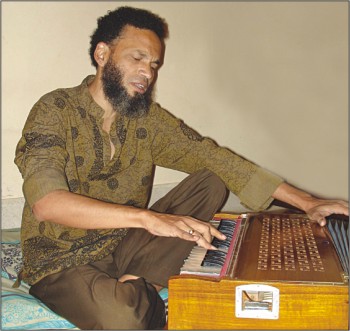In Conversation
Hyder Husyn and his candid, razor sharp words
Karim Waheed
Keuba gorey shonar Bangla, keu swanirbhor Bangladesh
Keuba gorey notun Bangla, goragorir neiko shesh
Keuba daye vote-er adhikar, keuba khawar daal-bhat
Shobai abar ek shurey koy shoirachari nipaat jak...Courtesy of Hyder Husyn's unpretentious, witty style and powerful message, this song (Bolorey hai hai) and others in the album Phaisya Gechhi, released last year, fast grabbed the contemporary music lovers' attention. Within a few months, songs from the album were playing everywhere and to the shock of this generation, the apparently "not so cool", "not with the trend" previous generations who usually sneer at the current trend of music, took notice and appreciated Husyn's candid and pertinent songs. How does Husyn feel about this newfound popularity? According to him, "I believe my songs speak of the silent majority in the country. The subjects are not alien. We've all been there, done that or at least thought of it at some point. Naturally people could relate to the songs." Husyn adds, "Interestingly though, when I was looking for a production house to make this album, no one would even touch it. The reactions I received were 'who would listen to these songs?' or 'these won't sell'. Eventually Ektaar Music liked my work and Phaisya Gechhi happened. I remember the first review of my album was published in The Daily Star; the songs were catching on. Now those people who didn't feel my album was worth their time try their best to butter me up and tell me they always thought the album was brilliant." Though he has recently come into limelight, Husyn is not a newcomer in the music arena. He started his career as a musician in the early '80s and performed with Azam Khan, Winning, Chime and Different Touch. Husyn had written and composed quite a few popular songs back in the day (including Mon kijey chai bolo) but never sang until Phaisya Gechhi. Husyn however, doesn't consider himself to be a singer. "I'm not at that level yet to call myself a quality singer. I'm first and foremost a musician. Initially I did want someone else to sing for the album but since no one was interested, Ektaar music suggested that I should sing them," says the artiste. For someone who doesn't consider himself to be a singer, Husyn's rendition of the title song in the album creates a contrasting impression. The song launches with a skilled Qawwali style alaap, building up a certain mizaaj (mood); but right away that mood is changed as Husyn renders Ami phaisya gechhi mainka chipaye in the Dhakaiyya accent. About the song, Husyn says, "I'm an original Dhakaiyya; grew up in Begumbazar. Dhakaiyya people have a very odd way of looking at things. Even when addressing serious issues, they speak in a way that can make you laugh till your sides hurt. The song validates that concept. And that Qawwali bit is included because traditionally in this part of the subcontinent, the genre used to be nurtured and enjoyed by Dhakaiyyas. Unfortunately, trashy Hindi songs have replaced Qawwali now." And what inspired him to write Tirish bochhor? Husyn's response: "At that point I had quit my job at Biman (Husyn has a degree in aeronautical engineering). I wasn't fit for Biman. I lived in Pikepara and after 9pm it looked like a ghost town. The streets were not safe at all. Rickshaws didn't want to go to that neighbourhood late at night. The whole situation made me feel I wasn't fit for Bangladesh. I questioned the validity of our 'independence'. Three decades after the Liberation War, are we really 'liberated'? That frustration made me write Tirish bochhor." Husyn is currently working on his next album. As he was playing on the Harmonium singing parts of his new songs - Hartaaler gaan and Ganotantrer gaan, it was evident the new album highlights the style that made the previous one a phenomenon.
|

Hyder Husyn singing at home. PHOTO: STAR |